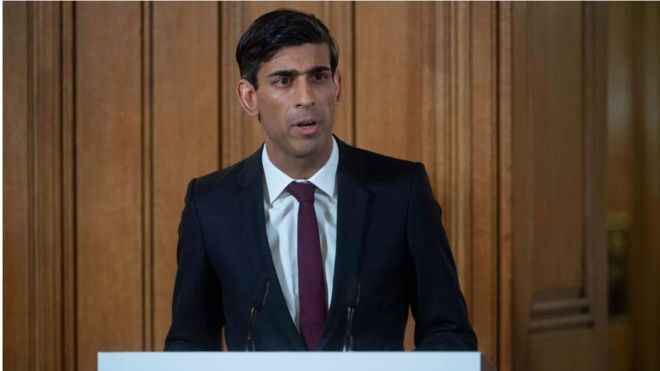The Treasury has confirmed it is considering offering 100% guarantees on loans up to £25,000 for small firms.
Chancellor Rishi Sunak said in March that UK-based small and medium-sized business could apply for interest-free loans to help them with Covid-19 related difficulties.
However, companies say they are still finding it difficult to get credit.
Bank of England governor Andrew Bailey has questioned whether the system is "too complicated".
According to BBC business editor Simon Jack, eligibility for loans has not yet been decided - namely, how small does a business have to be to qualify for a loan for which the lender gets a 100% guarantee.
Our business editor says an announcement is expected next week, if not earlier.
As many as one million of the UK's smallest businesses, employing no more than 10 workers, could benefit from the new rules, analysts say.
These include shops and pubs, which have been forced to close under coronavirus lockdown measures.
Loans to larger businesses under the coronavirus business interruption loans scheme (CBILS) will continue to get 80% backing.
The CBILS provide loans of up to £5m for companies with a turnover of less than £45m.
However, many firms have complained that loans are coming through too slowly and that some banks have imposed tough criteria on granting credit.
Alison Rose, chief executive of Natwest Group (formerly known as RBS), said it had so far processed 7,000 loans and that "help was getting through".
She said the stumbling block for many firms was "taking on additional debt when the future is very uncertain".
"Some businesses can't take on additional debt. It's important not to load debt on to a firm which isn't able to pay that back," she told the BBC's Today programme.
Laura Hurlocker, who runs a power generation company with her husband, has been turned down for a bank loan to keep the business going amid the virus.
Ms Hurlocker's Luton-based firm, Fourth Generation, supplies power generation equipment to live events, powering concerts hosted by Coldplay, Beyonce and Robbie Williams.
She applied for a CBIL loan from her bank Barclays, with whom she has been a customer for 16 years.
But her bank turned her down, partly because the business had other loans.
The business has some debts because she and her husband have invested £350,000 in equipment for the firm in the last three years.
"We feel we are being penalised," she told the BBC. "To be told because you have an existing loan, you are deemed by us to be unaffordable. It was a kick in the teeth."
Natwest's chief executive says that extending the guarantee to 100% on loans of up to £25,000 "would not make much difference" to the number of loans the UK's biggest lender to business would advance. She said the main challenge facing firms of all sizes was whether they wanted to take on additional debt at a time of great uncertainty.
While it is true that the guarantee is to the lender, not the borrower, many businesses have complained that banks have put them through an onerous loan approval process and have looked for ways to say no, given they could still lose 20% of sums advanced. However, privately, banks have told the BBC that a 100% guarantee would speed up the lending process.
It's not yet clear how the Treasury will define what it calls "micro-businesses" - whether it's judged on turnover or number of employees - but an announcement on that is expected early next week. So far, the government's loan guarantee scheme has seen a total of £2.8bn approved - a small fraction of the total £330bn available.
Although the pace of approval is picking up, business groups including the CBI have expressed frustration at the amount of financial help getting through and have called on the government to extend the 100% guarantee to businesses with a turnover of up to £45m.
The Treasury insists that the whole package of support should be seen in the round - including direct grants, a £30bn three-month VAT deferral, a business rates postponement and a furlough scheme that will see the government pay 80% of employees' wages, up to a cap of £2,500.
Source : BBC





